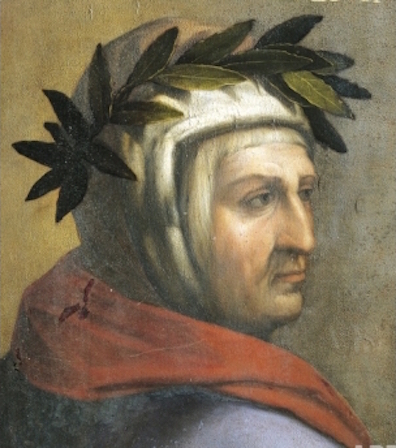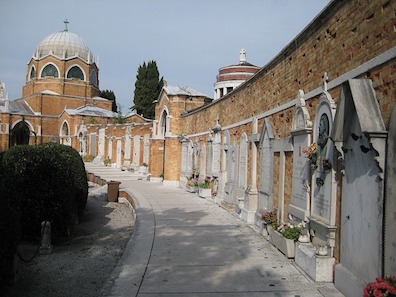Twice in Proteus, Stephen thinks of houses
metaphorically. Concluding his reverie about Richie Goulding's house in
Irishtown, he thinks, "Houses of decay, mine, his and
all.... Come out of them, Stephen. Beauty is not there."
Later, he thinks of a saying about the medieval poet Guido
Cavalcanti: "But the courtiers who mocked Guido in Or san
Michele were in their own house. House of..." Both houses
are "houses of decay." The artist is engaged in a war against
entropy.
As first noticed by Edmund Epstein in "Cruxes in Ulysses:
Notes Toward an Annotated Edition," The James Joyce
Review 1 (1957): 25-36, the anecdote about "Guido"
comes from a passage in Boccaccio's Decameron (6th
day, 9th story) in which Guido Cavalcanti is brooding among
the tombs around a church and some acquaintances mock him for
his pensive solitude. Gifford quotes from the story: "Guido,
you refuse to be of our society; but, when you have found out
that there is no god, what good will it have done you?" Guido
replies that they can say whatever they like to him, since
they are in their own house. Thinking about his statement
after he leaves, they realize that he means that their domain
is Death: "these arches are the abode of the dead, and he
calls them our house to show us that we...are, in comparison
with him and other men of letters, worse than dead men."
Guido Cavalcanti (1250-1300) was a close friend and mentor of
Dante Alighieri, and like him a troubadour poet who subjected
love to rigorous logical analysis, seeking to understand its
role in human life and the cosmos. Unlike Dante, he took
little comfort in religious idealism, balancing a sense of
love's spiritual exaltations with relentlessly scientific
recognition of its limitations. Boccaccio's story of a somber
contemplation of graves seems appropriate to this man who
regularly looked emptiness in the face. Cavalcanti's reply to
the courtiers (It is you who traffic in death, not I!) may
express a belief that only those who are willing to examine
their joys, and erect artistic structures to support them, can
truly be said to live. Casual affirmation of life is really an
acquiescence in our universal fate: death and decay.
Thinking of how poor a figure he cuts beside Mulligan's aquatic heroism, Stephen
mentally rehearses Boccaccio's story to justify himself, but
decides that it will not help him out of his embarrassment: "House
of... We don't want any of your medieval abstrusiosities.
Would you do what he did?" The earlier passage,
however ("Houses of decay... Come out of them,
Stephen. Beauty is not there"), shows him pondering
the Cavalcanti saying in a more useful way. In A Portrait
of the Artist as a Young Man, Stephen had argued that
"When the soul of a man is born in this country there are nets
flung at it to hold it back from flight. You talk to me of
nationality, language, religion. I shall try to fly by those
nets." Now, befitting the Protean theme, he thinks that to
incarnate beauty he must extricate himself from the pockets of
decay that would entrap him, and build his own house.

